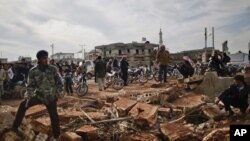President Bashar al-Assad’s military is attacking bakery facilities in rebel-held areas of the country in an attempt to undermine support for insurgents who have been trying for two years to topple his government.
Human rights activists in Syria say close to 400 people have been killed in such attacks in the past eight months. But despite the risks, activists say residents desperate for food continue to line up for bread each morning to get their daily allotment of the flat Syrian bread known as Tannour.
The office of the U.N. High Commissioner for Human Rights has said that if the bakery attacks are shown to be systematic and widespread, they could be considered war crimes or crimes against humanity.
On January 19, High Commissioner Navi Pillay repeated her request that the U.N. refer the Assad regime to the International Criminal Court for investigation.
Driving up prices for a starving population
The attacks on neighborhood bakeries are often carried out in the morning when 200 or more Syrians are lined up waiting to buy bread. Large commercial bakeries also have been hit, making the staple of the Syrian diet an expensive and rare commodity.
In a mid-January, the U.S. Agency for International Development (USAID) reported that in addition to the destroyed bakeries and flour mills, the shortage of flour, fuel and electricity have resulted in widespread bread shortages. USAID officials said late last week they pledged $10 million to supply Aleppo with enough flour for 210,000 Syrians for five months.
In the city of Aleppo, the price of bread rose from the equivalent of 10 cents a kilogram two years ago to $2.20 per kilogram last month, according to a non-government organization working with USAID.
According to USAID, a government plane bombed the only bakery left in the central Syrian town of Halfaya, where residents were waiting to buy bread. Western media accounts of the bombing said it killed more than 60 bakery customers.
In a similar incident, the opposition's largest activist networks, the Syrian Revolutionary General Commission (SRGC), says more than 90 residents were killed when a Syrian air force Sukhoi-22 jet dropped eight cluster bombs on the town’s sole surviving bakery.
Activists charge regime with terrorism
“The regime has deliberately and systematically been targeting bakeries and civilian gatherings lining in front of them in order to terrorize civilians and cause the highest death tolls…, ” the SRGC said in a report entitled Baked in Blood.
“Bread is one of the most important foods in Arab countries,” said Layal Mohammad, who contributed to the SRGC report. “Since the regime knows bread is a basic need for civilians, ovens and bakeries are being targeted.”
The SRCG study said such attacks have been carried out in nine of the country’s 14 provinces. Mohammad said the study could find no bakeries attacked in the five provinces under regime control.
Human Rights Watch eyewitness accounts
Human Rights Watch charged that over a three-week period last August, the Syrian government bombed or shelled areas around 10 bakeries in Aleppo province.
“Ten bakery attacks is not random – they show no care for civilians and strongly indicate an attempt to target them,” said Ole Solvang, a researcher for Human Rights Watch.
Human Rights Watch researchers witnessed some of the attacks, saying that government helicopters flew in firing rockets and dropping bombs. In some cases, people waiting in the bread lines heard the sounds of jets and helicopters and ran away. Others were hit by pieces of shrapnel.
One Human Rights Watch report described an incident in the town of Bab al-Hadid last August 23. It said a man it identified as “Fais” was standing at the doorway of the Aqyoul bakery, with as many as 200 residents lined up outside, when a government helicopter bombed the facility, killing at least 23 people.
“I heard the helicopter and started telling people that there was no more bread left,” the 44-year-old Fais told Human Rights Watch. “I just wanted them to leave, away from danger.”
“The bomb hit the corner of the street, and the shrapnel flew straight into the line – everyone still there was either killed or heavily injured,” Fais reported.
Human Rights Watch has accused the Assad government of indiscriminate attacks on civilians and has urged the U.N. Security Council to refer the matter to the International Criminal Court.
Human rights activists in Syria say close to 400 people have been killed in such attacks in the past eight months. But despite the risks, activists say residents desperate for food continue to line up for bread each morning to get their daily allotment of the flat Syrian bread known as Tannour.
The office of the U.N. High Commissioner for Human Rights has said that if the bakery attacks are shown to be systematic and widespread, they could be considered war crimes or crimes against humanity.
On January 19, High Commissioner Navi Pillay repeated her request that the U.N. refer the Assad regime to the International Criminal Court for investigation.
Driving up prices for a starving population
The attacks on neighborhood bakeries are often carried out in the morning when 200 or more Syrians are lined up waiting to buy bread. Large commercial bakeries also have been hit, making the staple of the Syrian diet an expensive and rare commodity.
In a mid-January, the U.S. Agency for International Development (USAID) reported that in addition to the destroyed bakeries and flour mills, the shortage of flour, fuel and electricity have resulted in widespread bread shortages. USAID officials said late last week they pledged $10 million to supply Aleppo with enough flour for 210,000 Syrians for five months.
In the city of Aleppo, the price of bread rose from the equivalent of 10 cents a kilogram two years ago to $2.20 per kilogram last month, according to a non-government organization working with USAID.
More than 90 Halfaya residents were killed when a Syrian air force Sukhoi-22 jet dropped eight cluster bombs on the town’s sole surviving bakerySyrian Revolutionary General Commission
In a similar incident, the opposition's largest activist networks, the Syrian Revolutionary General Commission (SRGC), says more than 90 residents were killed when a Syrian air force Sukhoi-22 jet dropped eight cluster bombs on the town’s sole surviving bakery.
Activists charge regime with terrorism
“The regime has deliberately and systematically been targeting bakeries and civilian gatherings lining in front of them in order to terrorize civilians and cause the highest death tolls…, ” the SRGC said in a report entitled Baked in Blood.
“Bread is one of the most important foods in Arab countries,” said Layal Mohammad, who contributed to the SRGC report. “Since the regime knows bread is a basic need for civilians, ovens and bakeries are being targeted.”
The SRCG study said such attacks have been carried out in nine of the country’s 14 provinces. Mohammad said the study could find no bakeries attacked in the five provinces under regime control.
Human Rights Watch eyewitness accounts
Human Rights Watch charged that over a three-week period last August, the Syrian government bombed or shelled areas around 10 bakeries in Aleppo province.
“Ten bakery attacks is not random – they show no care for civilians and strongly indicate an attempt to target them,” said Ole Solvang, a researcher for Human Rights Watch.
Ten bakery attacks is not random – they show no care for civilians and strongly indicate an attempt to target themOle Solvang, Human Rights Watch
One Human Rights Watch report described an incident in the town of Bab al-Hadid last August 23. It said a man it identified as “Fais” was standing at the doorway of the Aqyoul bakery, with as many as 200 residents lined up outside, when a government helicopter bombed the facility, killing at least 23 people.
“I heard the helicopter and started telling people that there was no more bread left,” the 44-year-old Fais told Human Rights Watch. “I just wanted them to leave, away from danger.”
“The bomb hit the corner of the street, and the shrapnel flew straight into the line – everyone still there was either killed or heavily injured,” Fais reported.
Human Rights Watch has accused the Assad government of indiscriminate attacks on civilians and has urged the U.N. Security Council to refer the matter to the International Criminal Court.









